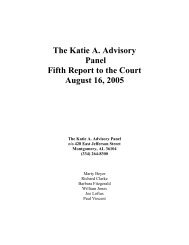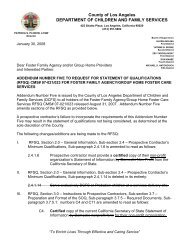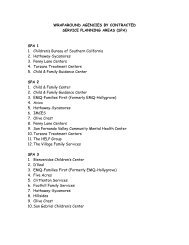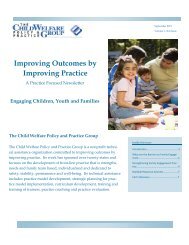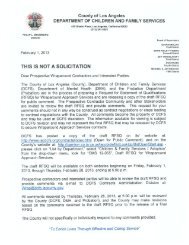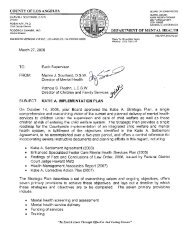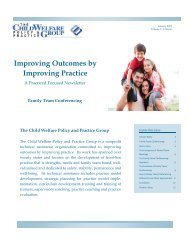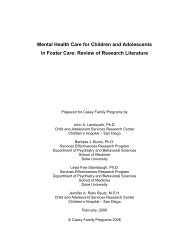Los Angeles County Self-Assessment Report
Los Angeles County Self-Assessment Report
Los Angeles County Self-Assessment Report
You also want an ePaper? Increase the reach of your titles
YUMPU automatically turns print PDFs into web optimized ePapers that Google loves.
<strong>Los</strong> <strong>Angeles</strong> <strong>County</strong> <strong>Self</strong>-<strong>Assessment</strong> <strong>Report</strong><br />
evaluations scored near the top of the 1-5 rating scale (1 is defined as very poor and 5<br />
is defined as very good). The average rating for each training and each dimension was<br />
calculated, with all results ranging from at least 4.15 to 4.94. These high ratings across<br />
all measures show that trainees are very satisfied with the quality and felt that they<br />
learned very well from the training offered.<br />
IUC’s performance assessment also included the administration of the Core Academy<br />
Proficiency Exam, which includes a pre-test on the first day of the Academy, and then a<br />
post-test on the final day of the Academy. The test includes 82 multiple-choice items<br />
that cover content from most modules offered in the Core, including plain content items<br />
and questions eliciting judgement about the correct implications for assessment and<br />
practice based on vignettes. Results show that Core Academy trainees achieve notable<br />
gains in scores between Academy Pre-test and Post-test, as trainees generally answer<br />
only half (58%) of the questions correctly on the Academy Pre-test but by Post-test,<br />
they are able to accurately answer almost three-quarters (74%) of test items, which is a<br />
15% gain on average.<br />
For the Statewide Standardized Core Modules for (1) Safety, Risk and Protective<br />
Capacity, (2) Case Planning/Case Management, (3) Placement and Permanency,<br />
DCFS CSW Core trainees scored higher than statewide new workers at a statistically<br />
significant level. With CMI I, our trainees scored equal to statewide new workers, and<br />
results for CMI II and Child and Youth Development are too new to report. DCFS is<br />
obviously pleased with this result and also grateful to have a sound and continuously<br />
improving training evaluation system in place to capture this kind of information.<br />
It is important to note that improving the quality and relevance of training is the primary<br />
purpose for collecting these data. Data from these evaluations are continually made<br />
available to DCFS, university centers, instructors, training coordinators, and in some<br />
instances, trainees. This feedback allows the training community to gauge the<br />
effectiveness of the training that is offered, and to develop plans for improvement.<br />
The Probation Department has several layers of training that have been developed to<br />
the serve the needs of its employees. The first is the standard training provided to meet<br />
the required 40 hours per year for every sworn employee working in the field offices or<br />
management; 24 hours per year for every sworn institution employee working in juvenile<br />
halls, camps or Dorothy Kirby Center. These trainings are conducted by outside<br />
vendors, Probation internal staff or independent contractors. The second is specialized<br />
training that is organized and conducted by each Bureau to meet the special needs of<br />
the employees that work within a special field or operation. The third is training that is<br />
organized and conducted when the Department sets forth a new initiative or practice<br />
such as the Title IV-E Waiver, Evidence-Based Practices or Strategic Planning. In<br />
addition to this, the Department organizes the State-mandated Juvenile Correctional<br />
113




